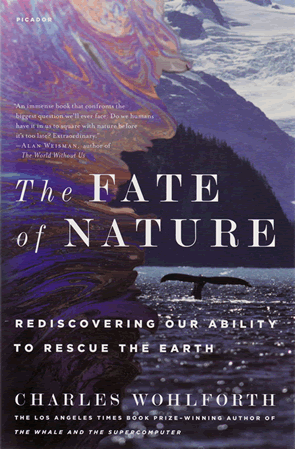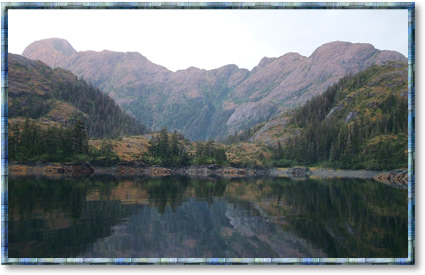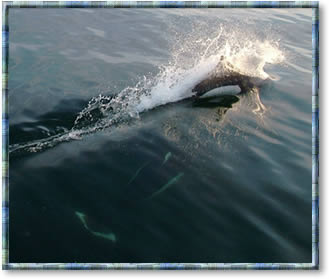 The Fate of Nature ~ Introduction
The Fate of Nature ~ Introduction
 Each of my oars produces a pair of vortices, those spiral waves that drill into the surface, and smaller swirls burble out behind the boat as I row alone on a soft summer evening along the shore of Alaska’s Kachemak Bay. My small liquid spirals spin in the same shape as the deep, dark gyre of water that circles the bay and concentrates marine life there, the same as the circular storms that roll over us from Siberia every few weeks, the same as the eternal counter-clockwise current that spans the North Pacific Ocean. I’m considering that similarity when a gull splashes down like a spear and pulls away with a flashing silver fish in its beak. Seal heads pop up from the water, watching me. They multiply, populating the surface like a theater audience, their eyes all on me, first five, then a dozen and more than twenty. I don’t know what they’re thinking, but they’re obviously thinking something or they wouldn’t all be paddling in place staring at me. And I wonder. What else is down there?
Each of my oars produces a pair of vortices, those spiral waves that drill into the surface, and smaller swirls burble out behind the boat as I row alone on a soft summer evening along the shore of Alaska’s Kachemak Bay. My small liquid spirals spin in the same shape as the deep, dark gyre of water that circles the bay and concentrates marine life there, the same as the circular storms that roll over us from Siberia every few weeks, the same as the eternal counter-clockwise current that spans the North Pacific Ocean. I’m considering that similarity when a gull splashes down like a spear and pulls away with a flashing silver fish in its beak. Seal heads pop up from the water, watching me. They multiply, populating the surface like a theater audience, their eyes all on me, first five, then a dozen and more than twenty. I don’t know what they’re thinking, but they’re obviously thinking something or they wouldn’t all be paddling in place staring at me. And I wonder. What else is down there?
The ocean is so vast, it’s everything—the source and sustenance of life, the birthplace of the rain and the cleanser of the air, the planet’s essential medium, upon which all the land is but an island.The ocean is so vast, it’s everything—the source and sustenance of life, the birthplace of the rain and the cleanser of the air, the planet’s essential medium, upon which all the land is but an island.Yet on and within the ocean every wave is different and every birth is new. To ponder its totality is like trying to think of the entire universe at once. On the other hand, the ocean can be drained of life, and in fact we’re on the way to making it uninhabitable, except perhaps as a kind of farm. The causes shouldn’t surprise anyone—overfishing, pollution, climate change and habitat destruction—issues so familiar their very names create a sense of mental fatigue. But the asymmetry is surprising, of magnificent vastness threatened by the petty and mundane. On one side a scale weighs the ocean, so immense and thick with meaning that the word itself is a synonym for greatness beyond imagining, and yet the other side swings down the scale, human values overbalancing toward wanting cheap fish-and-chips and leaving motor oil to dribble into storm drains. It’s worth asking how we’ve made this choice for things that are small and fleeting over an eternal source of life.
To take up that question is my project here, and to learn if we collectively can choose a less destructive course. Can we share protection of a great good we all can touch, but never individually hold? Such an investigation goes well beyond the technicalities of environmentalism, since our human species already has the technology to mitigate our downward pressure on the ocean’s vitality. Instead, the answer lies within ourselves, in our nature as animals taking a part in a planetary ecosystem. What capacity for good lies in the hidden depths of people? We must look into our spirituality, economics, politics and personal relationships. The exploration leads into the roots of caring and selfishness, well beyond the ocean’s edge, eventually including our entire physical space. But the ocean can represent all that—the vastness, complexity and fragility of the living world outside ourselves, the swirling exterior context that gives meaning to a look inside.
 On our Kachemak Bay beach my older daughter, Julia, at age 10, collected dozens of hermit crabs and put them together in a mobile tide pool she had built in a red wagon. They brawled madly, one-on-one and in a furious ball of fighting crabs. Hermit crabs wear discarded snail shells as armor against other hermit crabs, whom they attack in hopes of getting a better shell. The pursuit is indiscriminate, apparently with the default assumption that any shell might be better. A crab that Julia put alone in a sand pail with two similar shells circled compulsively, like a broken computer program, switching first into one, and then into the other, and then back into the first one, and so on endlessly. The rigor of the hermit crab’s competition for shells assures that none is ever satisfied and the fighting never ends. If there is a better way of living, it hasn’t survived in any tide pools we’ve ever looked into. A peaceful hermit crab produces no heirs.
On our Kachemak Bay beach my older daughter, Julia, at age 10, collected dozens of hermit crabs and put them together in a mobile tide pool she had built in a red wagon. They brawled madly, one-on-one and in a furious ball of fighting crabs. Hermit crabs wear discarded snail shells as armor against other hermit crabs, whom they attack in hopes of getting a better shell. The pursuit is indiscriminate, apparently with the default assumption that any shell might be better. A crab that Julia put alone in a sand pail with two similar shells circled compulsively, like a broken computer program, switching first into one, and then into the other, and then back into the first one, and so on endlessly. The rigor of the hermit crab’s competition for shells assures that none is ever satisfied and the fighting never ends. If there is a better way of living, it hasn’t survived in any tide pools we’ve ever looked into. A peaceful hermit crab produces no heirs.
If men were like hermit crabs, the world would be as dangerous as a tide pool, a scene of escalating struggle for stronger defenses and more control of resources by the powerful. Therein would lie our choice about how to use the oceans. Mercilessly driven by material needs that could never be fulfilled, we would be fated to overwhelm all other species and completely occupy the planetary habitat. In tragedy, fate is an arrow flying irretrievably from the preordained nature of a protagonist to his or her undoing. A world-dominant being whose nature is to be unsatisfied and seek wealth beyond surfeit is doomed to loneliness as the solitary survivor of a biosphere, accompanied only by the plants and animals raised for food or amusement. Is that our fate?
The idea that humans are such competitive beings blossomed in the seventeenth and eighteenth centuries, the Enlightenment in Europe, with the invention of the social and political mechanisms of the market economy. This hermit crab doctrine decreed freedom and opportunity for the individual, and slavery and cultural annihilation for world peoples without strong shells or the traditions of struggling for them. The success of the competitive model of human nature became its own proof. To oppose it now would seem as naïve as to run for public office opposing economic growth. Even mainstream environmentalists accept this forlorn verity about the human future, hiding their true love for wild nature to argue for ecosystems as instruments of economic power, either for service to humankind or as desirable chattel.
If we’re to imprint our good will on the world, those wishes have to vie in the same arena as our selfishness. Science seemed to agree that people are essentially shell fighters, as evolution interpreted the ascent of our species as a sign of our competitive success. Writers cherishing ethics and generosity often retreated to the intellectual ghetto of religion, which supposedly is inaccessible to scientific reasoning. But placing our better selves in such a refuge from hard truth is like saving the whales by putting them in aquariums. If we’re to imprint our good will on the world, those wishes have to vie in the same arena as our selfishness. And, increasingly, science does support the strength of human altruism and our will to conserve. In reality, as we always should have known, individualistic competition is not universal human nature. It’s only one way of living, and a peculiar one that doesn’t address the deeper needs of most people.
Evidence comes from many university departments and, most convincingly, from real life. Stronger than our greed and materialism, most of us feel a connection to other people, to animals and wild places, and when we’re faced with a choice between those sources of meaning and our own material gain, we tend to prefer fairness and the bonds of the heart over getting ahead. Discovery of these positive impulses has made scientific news. In our competitive paradigm, the existence of goodness is news: we’re that embedded in a system that elevates wealth above purpose and severs the connecting tissues of our community relationships. The hermit crab model of human nature may be factually wrong, but it usually is treated as self-evident truth.
 The Fate of Nature seeks to unmask false assumptions about human nature. I’ve used the particulars of people’s lives, their places and times, as well as the ideas and experiments of a wide variety of scientists. Since I began this work a historic economic wreck has helped expose the flaws of a purely competitive worldview. Presenting the alternative is more difficult, however, partly because of the cynicism we’ve absorbed: we’re trained to discount the hope of cooperation. But saving the oceans will require cooperation. People must believe in their ability to connect as communities, and believe in the right of communities to manage their own environments for the benefit of their values. The seemingly Quixotic project of diverting the earth’s arrow of fate relies on the potency of these beliefs. The shared sense of right and wrong about how we use the world—our social norms—are the ground upon which institutions stand. Norms are made by individuals and personal relationships. By influencing norms, seemingly ineffectual acts can power irresistible social movements.
The Fate of Nature seeks to unmask false assumptions about human nature. I’ve used the particulars of people’s lives, their places and times, as well as the ideas and experiments of a wide variety of scientists. Since I began this work a historic economic wreck has helped expose the flaws of a purely competitive worldview. Presenting the alternative is more difficult, however, partly because of the cynicism we’ve absorbed: we’re trained to discount the hope of cooperation. But saving the oceans will require cooperation. People must believe in their ability to connect as communities, and believe in the right of communities to manage their own environments for the benefit of their values. The seemingly Quixotic project of diverting the earth’s arrow of fate relies on the potency of these beliefs. The shared sense of right and wrong about how we use the world—our social norms—are the ground upon which institutions stand. Norms are made by individuals and personal relationships. By influencing norms, seemingly ineffectual acts can power irresistible social movements.
Therein lies my audacious purpose in writing: to prod this unseen organism of collective belief. I’ve started the book by asking what we are—what makes a person? The answer also tells why the lives and freedom of other animals should matter to us. After that exploration, The Fate of Nature follows the varied ways cultures and ideologies relate to nature. It happens that I live in a place of sublime beauty and biological wealth where conflicting worldviews have repeatedly collided and reshaped the ecosystem. The vital ferocity of the Gulf of Alaska coast seems untamable, but even these waters have been poisoned with oil and chemicals and the foodweb has been torn and weakened. With such damaging marks, invaders wrote of their supremacy, questionable certainties penned on the land and under the water, and engraved as generational grief upon people living along the shore.
The drama of the ocean’s fate plays out here in Alaska as a world in microcosm. The drama of the ocean’s fate plays out here in Alaska as a world in microcosm. At this date its shape resembles tragedy, but the curtain hasn’t fallen yet. There’s plenty of life and wildness left in these swirling waters. Perhaps the heroic and often hopeless deeds of generous individuals can shift the very stage; such people are here and trying. I will tell their stories. Lonely summers spent picking up plastic bottles from thousands of miles of fog-swept wilderness beaches could be meaningless, or could be the edge of a social transformation.
Not much of The Fate of Nature is about me. Probably, what I have to say is true for some and not for others. To feel, irresistibly, that a place or animal means something fundamentally valuable beyond one’s own life, a feeling of love akin to that for a spouse or child—I wish everyone felt that, but I can’t say how many people do. I would readily concede the feeling has more to do with the one perceiving than the thing perceived. None of that ultimately matters. The will to give is real, found in most of us. We do yearn to act selflessly, to leave space for other living beings. Our desire for a society similarly generous of life is all the explanation we need to begin changing the world.
TO TOP

